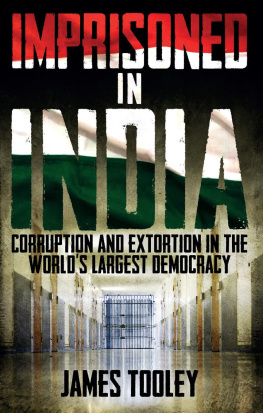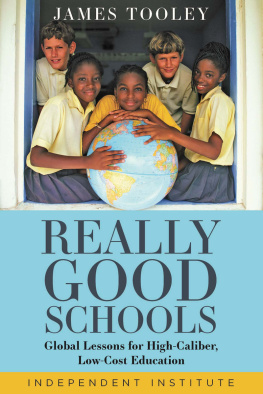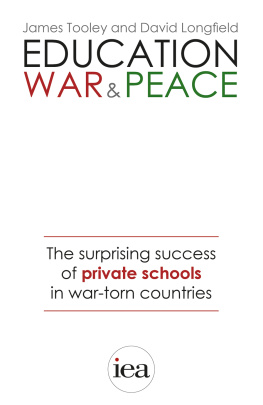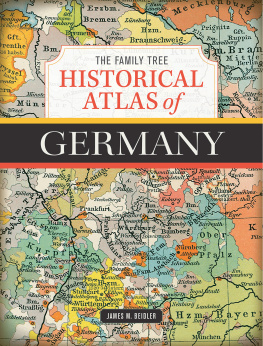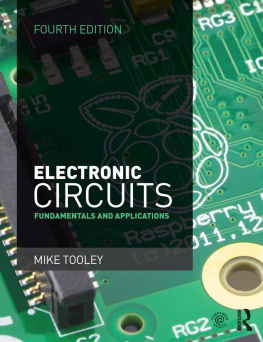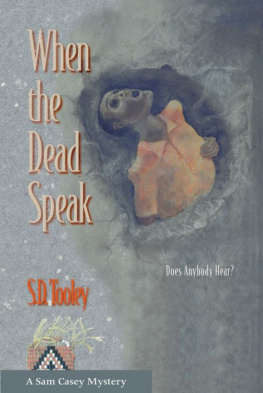Acknowledgments
First, I want to thank all the educational entrepreneurs I have met over the years who are actively serving poor communities. Some of those I am working with now, who deserve my deepest appreciation and admiration, are M. Anwar, Reshma Lohia, Yasmin Haroon Lohi, K. Surya Reddy, K. Narsimha Reddy, M. Wajid, Ghouse M. Khan, S. A. Basith, M. Faheemuddin, Alice Pangwai, George Mikwa, Fanuel Okwaro, Theophilus Quaye, Ken Donkoh, B. S. E. Ayesminikan, and Liu Qiang. For assisting in funding and associated advice and support over the years, I want to thank (in roughly chronological order) Neil McIntosh; Michael Latham; Tim Emmett; the late Sir John Templeton; Jack Templeton; Charles Harper; Arthur Schwartz; Chester Finn; Peter Woicke; Stuart, Hilary and Andrew Williams; Theodore Agnew; and Richard Chandler. Colleagues and friends who have supported and encouraged me in my endeavors include Khan Latif Khan, Jack Maas, Gurcharan Das, Nandan Nilekani, the late Kwadwo Baah-Wiredu, I. V. Subba Rao, Hernando de Soto, Christopher Crane, Parth Shah, James Shikwati, Thompson Ayodele, Lanre Olaniyan, Barun Mitra, S. V. Gomathi, P. Paul Saran, Sailaja Edla, Chris and Suzie Jolly, Naveen Mandava, Bob Leighton, Deepak Jayaraman, Leonard Liggio, Jo Kwong, Terence Kealey, Linda Whet-stone, and John and Chris Blundell. For helping me to build the first embryonic chain of low-cost private schools in India, I thank Paul Gabie and the Orient Global team. Simon Kearney gave me useful comments on the manuscript, as did five anonymous referees, to whom Im deeply grateful. Andrew Coulson has been the kind of editor and supporter an author dreams of, through good times and bad. Finally, I give thanks to my friends, colleagues, and students at Newcastle whove been an indispensable part of my life and work: Elaine Fisher, Karen Hadley, Nuntarat Charoenkul, Ekta Sodha, Liu Qiang (again), James Stanfield, Sugata Mitra, Richard Graham, and Pauline Dixonto whom this book is dedicated.
About the Author
Fresh out of college in the early 1980s, James Tooley went to Zimbabwe to become a public school teacher. Now an award-winning scholar featured in PBS and BBC documentaries, he has written several books, and his work has been covered in Newsweek, the Atlantic, the Wall Street Journal, and the Financial Times. Tooleys career as an academic began at the University of Oxford, his PhD is from the University of London, and he is professor of education policy at the University of Newcastle upon Tyne. He currently splits his time between Hyderabad, India, and Beijing, China, where he works with the entrepreneurs and teachers who inspired this book.
Postscript
Just as I was finishing writing the book, I heard about the First Annual Private-Sector Development Competition, jointly organized by the Financial Times and the International Finance Corporation. They were looking for essays based on research that would help move forward understanding of how the private sector could assist development, and how this might open up opportunities for investors. And they had assembled an impressive array of judges, including the authors of influential books on development, such as Martin Wolf (Why Globalisation Works), Hernando de Soto (The Mystery of Capital,) and C. K. Prahalad (The Fortune at the Bottom of the Pyramid.) My team leader in Nigeria, Lanre, e-mailed me and said I should enter. So I thought Id give it a go, with little expectation of success.
I condensed the last chapter of this book and my research findings into an essay, Educating Amaretch: Private Schools for the Poor and the New Frontier for Investors. While harvesting potatoes and onions in my garden in rural Northumberland in late August 2006, I received a phone call from the International Finance Corporation office in Washington. I had to get Thomas Davenport to repeat his message several times before I could believe what Id heard: Id won the gold prize! I was flabbergasted, excited, humbled. For a couple of nights I could hardly sleep, I felt so elated that these ideas on private schools had found a sympathetic audience. No longer was I to plow a lonely furrow.
I was flown to Singapore for a long weekend in September 2006 to pick up the prize at the annual Governors Meeting of the World Bank and International Monetary Fund. I was honored to meet with the judges, to discuss their ideas, and to hear about the other prize-winning entries. The day after the presentation, the Financial Times published an edited version of my essay, under the title Private Schools for the Poor Seek Investors. A day later, a message was waiting for me on my answer machine: Professor Tooley, Ive read your article in the Financial Times... well, Im your investor. It was Richard Chandler, the New Zealander founder and chairman of the Singaporean private investment company Orient Global. Over the course of the next two months, we met, in Newcastle and Dubai, exploring ways in which we could collaborate on our shared vision of how to improve lives and increase prosperity through market-based solutions. It was such an incredible opportunity, to do something practical based on all the ideas I had accumulated during the course of my journey.
In April 2007, I joined Orient Global as president of its newly created $100 million Education Fund, aimed at investing in private education in emerging economies. The Fund has given grants to several of the organizations and people mentioned in this book: to George Mikwa and the new Kenya Independent Schools Association, working in the slums of Nairobi; to AFED, the Association of Formidable Educational Development, serving low-cost private schools in the shantytowns of Nigeria; to Joys school in Zimbabwe after Mugabes troops bulldozed the shantytowns where her parents lived; and to scholarship schemes serving the remote village private schools in rural Gansu, China.
Most significantly, through the Fund Ive laid the foundation for a chain of low-cost private schools. Closely following ideas set out in the last chapter. Ive guided the initial research and development for curriculum, technology, and learning methods, acquired the first schools and built a strong team to carry the vision forward. The education entrepreneurs Ive known longest are based in Hyderabad. So it is there for the last two years I made my home, and where I am writing this conclusion, working closely with Anwar, Wajid, and Reshma, all people I first met back in 2000, when my journey started.
And so this story ends in Hyderabad, where it began. The story of private schools serving the worlds poor is only beginning.
References
Action Aid. 2003. Response to World Development Report 2004. Submission to the World Development Report 2004: Making Services Work for Poor People. Washington: World Bank.
Adam, William. 1841. State of Education in Bengal, 1835-38. In The Beautiful Tree: Indigenous Indian Education in the Eighteenth Century, by Dharampal, pp. 265-352. Coimbatore: Keerthi Publishing House, 1995.
Adelabu, M., and P. Rose. 2004. Non-State Provision of Basic Education in Nigeria. In Nigeria: Study of Non-State Providers of Basic Services, ed. G. Larbi, M. Adelabu, P. Rose, D. Jawara, O. Nwaorgu, and S. Vyas. Commissioned by Policy Division, Department for International Development (DfID), UK, Country Studies, International Development Department, University of Birmingham.
Andhra Pradesh Education Act 27 of 1987. In Law of Education in Andhra Pradesh, 2nd ed., vol. 1, by V. J. Rao. Hyderabad: J. D. Gogia for S. Gogia & Company, 2000.
Asia Development Bank. 2003. Technical Assistance to the Peoples Republic of China for Preparing the Gansu Roads Development Project. TAR:PRC 33470. www.adb.org/Documents/TARs/PRC/tar_prc_33470.pdf.


